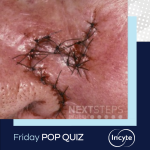
The correct answer is A. Rhombic Flap
The rhombic flap is a type of transposition flap. The classic rhombic flap is designed with two 60-degree angles and two 120-degree angles. The point of maximum tension is at the closure of the donor site.
Incorrect answer explanation: Rotation flaps have incision lines in arcs of rotation recruiting lax skin adjacent to a defect. An interpolation flap elevates skin of a donor site at a distance to the defect. The pedicle then traverses over intervening normal skin to reconstruct the defect before being ultimately severed from the donor site pedicle at a later time. Island pedicle flaps are typically released from all lateral vascular pedicles and advanced into a defect based on a deep vascular pedicle only – giving the final appearance of a kite on a string. Full thickness skin grafts are disconnected entirely from their vascular pedicle and sutured into a defect – incision lines appear as a full circle or rectangle.
References
- Miller CJ: Design principles for transposition flaps: the rhombic (single-lobed), bilobed and trilobed flaps. Dermatol Surg 2014; 40: pp. S43-52 . PMID: 25158876
